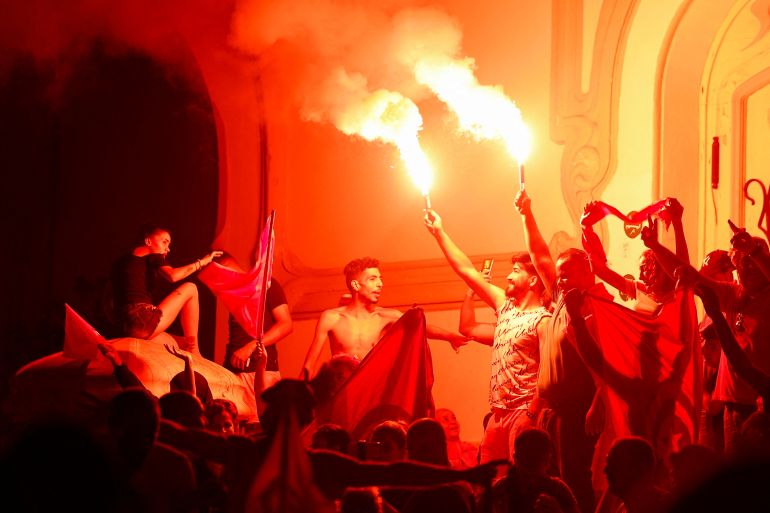Saied’s supporters celebrate new constitution, but turnout is low
Opposition largely boycotted the referendum, refusing to legitimise President Saied’s new constitution.

Tunis, Tunisia – Some Tunisians have begun celebrating a win for the “Yes” vote in a constitutional referendum brought by President Kais Saied, despite the election authority saying only about a quarter of registered voters had turned out.
An exit poll from Sigma Conseil, a Tunisian polling company, said 92.3 percent of voters had backed the new constitution, which opponents say will entrench one-man rule.
Keep reading
list of 4 itemsTurnout expected to be low as Tunisians vote on new constitution
Photos: What Tunisian protesters want
Will Tunisia’s constitutional referendum lead to turmoil?
Only 7.7 percent voted “No”. Out of some nine million registered voters, just 1.9 million people came out to vote, with the opposition mainly choosing to boycott the vote.
A couple of hundred people crowded onto the steps of Tunis Municipal Theatre to sing and chant popular slogans while cars circled Avenue Habib Bourguiba, which saw the final chapter of the 2011 uprising that overthrew the authoritarian president, Zine El Abidine Ben Ali, and began the Arab Spring.
A few hours later, they were joined by Saied himself, who gave speeches and answered questions from local and international press.
Saied addressed his supporters in central Tunis in the early hours of Tuesday morning after a walkabout and appeared sure that his constitution had been approved, referring to the referendum day as “an historic moment”.
Low support
Saied’s supporters are expecting radical change, if not miraculous solutions, to the economic strife that has fuelled demonstrations and strikes in Tunisia.
Sharan Grewal, assistant professor at the University College of William and Mary in Virginia and a non-resident fellow at the Brookings Institution, told Al Jazeera the opposition could make a political profit from the low voter turnout.
“It depends how they frame this. It shows that 72 percent do not support Saied’s project …” Grewal said, adding “but that assumes that they were actively boycotting, not just not voting.”
Grewal said the way for opposition movements to convince common Tunisians that the majority of them were against the plan “would be to hold a big protest” rather than a series of small ones.
The opposition had struggled to unite before the vote, and had held separate anti-referendum protests.
It is not yet clear how Saied plans to proceed.
No minimum level of participation was set for the referendum, so the constitution, which will change the country from its current hybrid parliamentary democracy to one where the president has sweeping powers, will be adopted.
Saied, who has been ruling by decree for a year, has already amassed significant power, removing the parliament and sacking dozens of judges.
Said Benarbia, the director of the Middle East and North Africa programme at the International Commission of Jurists, which has been consistently outspoken on Saied’s various moves against the judiciary over the past year, told Al Jazeera that the new constitution risked serious abuses of power, and warned that the changes fundamentally undermine human rights and the rule of law.
“Under the proposed constitution, both the parliament and judiciary are subordinate to the executive and the president,” Benarbia told Al Jazeera. “Their powers and competencies to act as a check on the executive were either weakened or removed altogether.”
The opposition now worries that violence against anti-referendum protesters before the vote, and court cases against opposition figures, such as Ennahdha leader Rachid Ghannouchi, are a sign of things to come.
“All the checks and balances that were provided and the guarantees for the separation of powers and the independence of the judiciary were removed,” said Benarbia, adding: “making the police directly subordinate and accountable to the president … [is] moving from a framework of the rule of law, to a police that is [only] responsible to the president.”